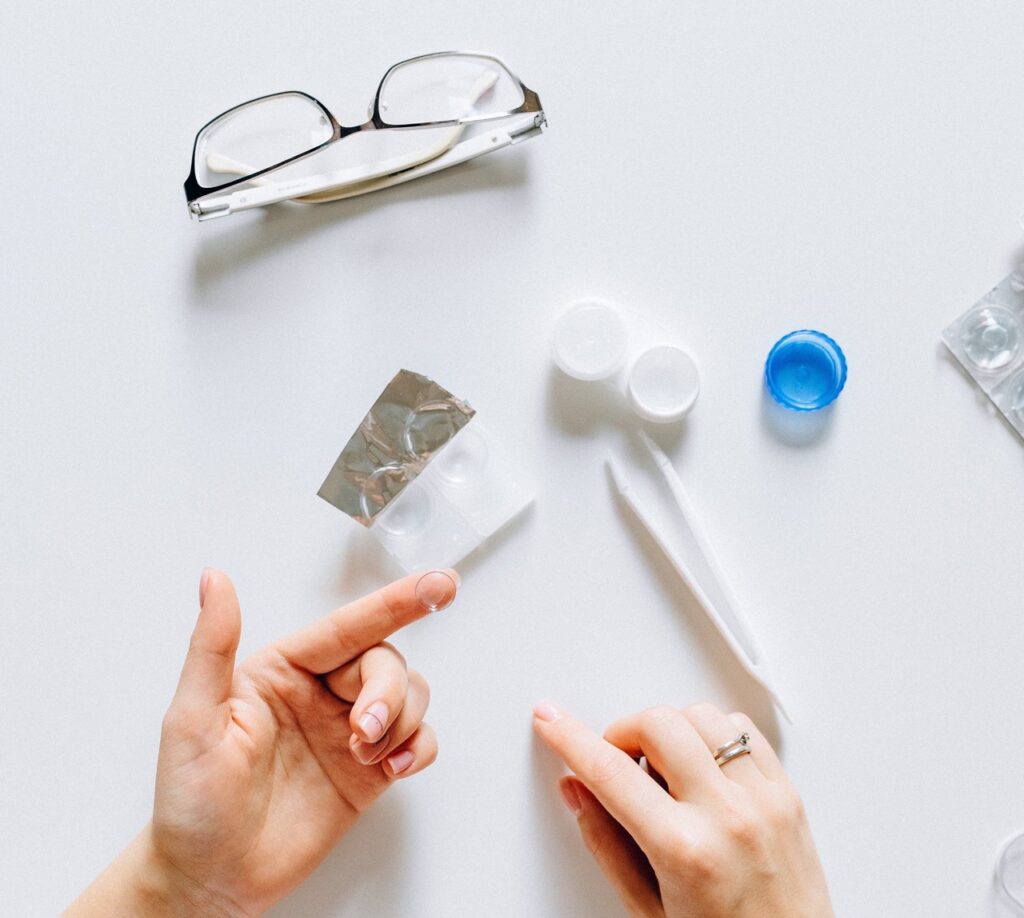No products in the cart.
People often say that the eyes are the windows to the soul. They are also the main way we see the world around us. But in the busyness of daily life, we might forget how important it is to take care of and protect these valuable systems. As a lighthouse, this article shows you the way to better eye health by following the right care and hygiene habits. We start a journey to protect the clarity, comfort, and health of our eyesight by learning the basics of eye structure and using useful tips for keeping our vision clear and avoiding common eye problems. Let’s learn more about eye care and form habits that will not only keep our eyes healthy but also make our lives better in general.

Understanding Eye Health and Vision
Proper eye care and hygiene practices are critical to preserving healthy eyes and eyesight. Understanding eye health and vision is the first step toward avoiding vision loss and blindness.
Common Eye Conditions and Diseases
Several eye illnesses can cause vision loss or blindness. The most prevalent eye ailments and diseases include macular degeneration, cataracts, diabetic retinopathy, and glaucoma. These disorders can be caused by a multitude of variables, including age, family history, and lifestyle habits.
Macular degeneration is a disorder that affects the central portion of the retina, resulting in loss of central vision. Cataracts are cloudy lenses in the eyes that can cause hazy vision. Diabetic retinopathy is a diabetes condition that causes damage to the blood vessels in the retina, resulting in visual loss. Glaucoma is a series of eye illnesses that damage the optic nerve, resulting in vision loss and blindness.
Importance of Regular Eye Exams
Regular eye exams are required to maintain healthy eyes and eyesight. Eye exams can discover eye disorders and problems early, before they lead to visual loss. Eye exams can also reveal other health issues, such as high blood pressure and diabetes.
Adults should undergo a full eye exam every 1-2 years, depending on age and risk factors. Children should receive their first eye test at the age of six months, followed by another at three years old and before starting school.
Impact of Age and Genetics on Eye Health
Age and heredity can have a big impact on eye health. People’s risk of developing eye disorders and ailments increases as they age. Family history might also raise the likelihood of acquiring eye illnesses including glaucoma and macular degeneration.
While age and genetics are unchangeable, there are lifestyle choices that can help maintain good eyes and eyesight. Eating a nutritious diet, not smoking, and wearing sunglasses to guard against UV rays are all beneficial to eye health.
To summarize, understanding eye health and vision is critical for preserving healthy eyes and avoiding vision loss and blindness. Regular eye checkups, a healthy lifestyle, and being aware of risk factors can all help to keep your eyes and eyesight healthy.

Daily Eye Care and Hygiene Practices
Taking care of your eyes is vital for overall health. Proper cleanliness can assist to avoid eye infections and illnesses. Here are some everyday eye care and hygiene tips to help keep your eyes healthy.
Proper Cleaning and Handling of Glasses and Contacts
If you wear glasses or contacts, make sure you clean and care for them appropriately. Dirty glasses or contacts can lead to eye infections and irritation. To clean your glasses, use a soft cloth or lens cleaning solution. Clean your contacts according to the recommendations supplied by your eye doctor or the manufacturer. To avoid the spread of bacteria, always wash your hands before handling glasses or contacts.
Importance of Handwashing and Eye Touching
Washing your hands frequently is an essential aspect of keeping good eye health. Hands can carry bacteria and viruses that can cause eye infections. To prevent germs from spreading, avoid touching your eyes with your hands. If you need to touch your eyes, carefully clean your hands first.
Managing Screen Time and Eye Strain
Long hours in front of a computer or other digital device can lead to eye strain and weariness. To avoid this, take regular breaks and look away from the screen every 20 minutes. Blinking frequently might also help prevent dry eyes. Adjust your screen’s brightness and contrast to reduce eye strain.
In addition to these measures, getting enough sleep, utilizing your doctor’s recommended eye drops, and being hydrated can all help you maintain good eye health. By implementing these habits into your everyday routine, you may help maintain your eyes healthy and avoid eye infections and disorders.

Nutrition and Lifestyle for Optimal Eye Health
Dietary Choices That Support Eye Health
A nutritious diet is vital for keeping your eyes healthy. Omega-3 fatty acids, vitamins C and E, and zinc are all recognized to promote eye health. Green leafy vegetables such as kale and spinach, as well as carrots, are high in these nutrients and should be included in everyone’s diet. Fish, particularly tuna and salmon, are great suppliers of omega-3 fatty acids.
The Effects of Smoking and Alcohol on Vision
Smoking and alcohol usage can have a harmful impact on eye health. Smoking raises the risk of age-related macular degeneration, cataracts, and optic nerve damage. Quitting smoking is vital for maintaining good eye health. Excessive alcohol drinking can cause vision difficulties, such as blurred vision and difficulty focusing. To preserve good eye health, it is recommended that you restrict your alcohol usage.
Exercise and Its Benefits for Eye Health
Regular activity is beneficial for keeping your eyes healthy. Exercise increases blood flow and reduces the risk of eye illnesses like glaucoma and age-related macular degeneration. Maintaining a healthy weight and engaging in moderate exercise, such as brisk walking, running, or cycling, is recommended for optimal eye health.
To summarize, good eye health involves a combination of appropriate dietary choices, frequent exercise, and healthy habits like quitting smoking and limiting alcohol intake. By adhering to these principles, you can maintain good eye health and avoid visual difficulties.

Protecting Your Eyes from External Factors
When it comes to eye protection, external variables like UV rays, dust, allergens, and chemicals can be harmful. Proper eye care and hygiene practices can help you avoid infections, injuries, and keep your eyes healthy.
Choosing the Right Sunglasses and Protective Eyewear
Choosing the correct sunglasses and protective eyewear can help shield your eyes from dangerous UV radiation and other environmental hazards. Look for sunglasses that block 100% of UVA and UVB radiation. It is also critical to get sunglasses that fit well and shield your eyes entirely.
Workers in locations where there are possible eye dangers should wear safety glasses or protective eyewear. Protective eyewear should be selected based on the unique threats in the environment. For example, safety glasses with side shields can guard against flying debris, whereas goggles can protect against chemical splashes.
Preventing Infections and Injuries
Infections and injuries can also be harmful to your eye health. To avoid infections, follow excellent hygiene habits such as washing your hands frequently and not touching your eyes. If you have an eye illness like blepharitis or conjunctivitis (pink eye), don’t share towels or other personal belongings with others.
Sports, dust, and chemicals are all potential sources of eye injuries. To avoid injuries, it is critical to wear suitable eye protection when engaging in sports or working in potentially hazardous areas. If you get something in your eye, don’t touch it, as this can cause more harm. Instead, rinse your eye with water and seek medical assistance if needed.
Overall, protecting your eyes from external causes necessitates a mix of proper eye care and hygiene practices, as well as the use of suitable eye protection as needed. By following these procedures, you may help keep your eyes healthy and avoid infections and damage.
Trusted Health, Wellness, and Medical advice for your well-being



Recommended Posts
Is Lemon Water Good for Uric Acid
Lemon water is becoming increasingly popular as a refreshing and purifying beverage. Can this tangy
How To Keep Women’s Eggs Healthy
Are you seeking for techniques to increase your fertility and keep your eggs healthy? In
Is Your Chest Pain Muscle Strain or Heart Trouble? Find Out Now
Chest pain is a frequent symptom that can be caused by a number of conditions,
Demystifying Strep Throat: How it Spreads and How to Protect Yourself
Strep throat, a common bacterial infection, spreads quickly and causes discomfort and difficulty for individuals
Transform Your Life Through Dance Therapy
Welcome to an examination of the interesting field of dance therapy. This article investigates the
Is There a Medical Test for Arthritis?
A number of physical changes, such as stiffness and soreness in the joints, are common